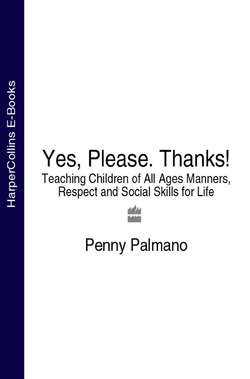Читать книгу Yes, Please. Thanks!: Teaching Children of All Ages Manners, Respect and Social Skills for Life - Penny Palmano - Страница 9
Оглавлениеone
The Buck Stops Here
Everything we buy these days comes with hard and fast care instructions. Whether it’s a pair of knickers or a frying pan we are told exactly how to look after them.
But a child doesn’t come with instructions. We simply leave home one day and return with a small human life which is totally dependent on us for love, food, comfort, education, clothing, a home, and for being brought up to be a well-balanced, well-behaved, well-adjusted, confident individual. WHAT? The responsibility of it all is enough to make any parent break out in a sweat and lay down in a darkened room with a large, nerve-calming drink.
So is it simply good luck if we have well-behaved children who are a delight to be around, or incredibly bad luck that we end up with uncontrollable, rude, disrespectful little ‘horrors’ that are a constant nightmare and embarrassment to us?
Let’s face it, how many times have we thought or said about someone else’s children:
‘Why on earth does she let those children do that?’ ‘Just as long as they don’t bring those ghastly children.’ ‘Did you see the way that child was eating?’
Imagine if these comments were directed at your own children. Now don’t panic, even if you suspect they already have been, and don’t criticize or label yourself a bad parent and accept things the way they are – just address the problem. Get back in control.
The good news is that all children can be brought up to be well-behaved, well-mannered, polite and respectful, regardless of their personality or character. Obviously, all children are different and a very strong-willed child may need a stronger sense of his boundaries than a calmer, quieter child but both can be equally well-behaved and a credit to their parents.
But How?
Teaching good behaviour, manners and respect starts almost from day one. The way we are with our children from the very early days will start to form and mould the way they are going to behave. So basically, it’s easier if we don’t let them get into bad habits and then try and correct them. It is so much easier, for everyone concerned, if they learn everything the right way from the beginning, not dissimilar to puppy training.
For example, if we take a puppy to training classes as early as possible, it will learn to walk correctly on a lead, sit and stay when told. But if we don’t train it from an early age, by the time we realize our dog is uncontrollable and we decide to start teaching him, our problems have multiplied tenfold. That old saying, ‘One word from me, and he does as he likes’, can equally be said about some children.
The sooner you start the easier it is.
Manners and Respect in the 21st Century – Why We Still Need Them
Manners, respect and simple courtesies should be second nature to everyone. They should not be considered as some sort of optional extra, as if we were deciding whether to have an electric sun-roof or tinted glass in a new car. They are as important as the steering wheel! And manners are not just about saying ‘please’ and ‘thank you’; they show a consideration for our fellow man and are a condition of a civilized society. They are the oil that smoothes the machinery of society.
The acid test of our children’s behaviour is how others perceive it. Their social education is as important as their academic one. As someone once said, manners are worth another A-level. You are actually disadvantaging your children if you don’t teach them, so come on, put in that time and effort. After all, don’t they deserve the best?
